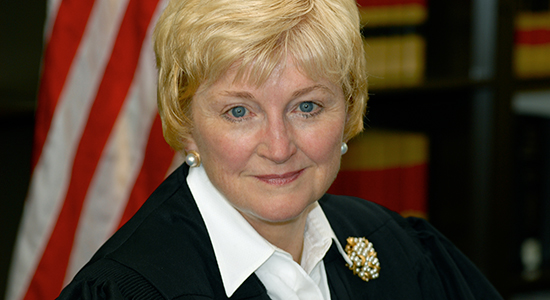
Oct. 31, 2018 – Addressing the low hourly rate paid to private bar attorneys who take public defender cases is a priority for Wisconsin Supreme Court Chief Justice Patience Roggensack, who delivered the State of the Judiciary Address today.
“Currently, I am working with Kelli Thompson, State Public Defender, and members of the legislature to move forward on increases in the pay rates for contract public defenders,” Chief Justice Roggensack said. “Increasing those rates is necessary to assure that every defendant in a criminal trial has accessible, competent counsel.”
Private bar attorneys handle overflow and conflict cases on contract through the State Public Defender’s Office to ensure criminal defendants’ right to counsel in criminal cases. The hourly rate paid to handle those cases is $40, the lowest rate in the country.
The Wisconsin Legislature set the $40 rate ($25 per hour for travel time) 23 years ago in 1995. It was a $5 change from the $35 per hour rate set in 1978, 40 years ago. The $40 hourly rate is the same regardless of the case type or the lawyer’s experience.
In prior years, the private bar has handled about 40 percent of SPD’s cases. But fewer lawyers are taking them – the rate hardly covers overhead – and many are handled by inexperienced attorneys under flat-fee contracts creating conflicts of interest, according to John Birdsall of the Wisconsin Association of Criminal Defense Lawyers (WACDL).
This raises the question of whether defendants are receiving effective assistance of counsel, a constitutional right. Birdsall’s group, in a petition that was submitted to the Wisconsin Supreme Court last year, said the $40 rate is creating a constitutional crisis. The State Bar of Wisconsin's Board of Governors voted to support the petition.
Absent legislative action, WACDL asked the state supreme court to increase the SPD rate from $40 to $100 per hour. The court declined to do so, explaining that constitutional issues must be presented to the court as a case or controversy.
However, the court acknowledged that the $40 rate is “unreasonable” and urged the legislature to work with the judiciary and others “to ensure adequate funding for the SPD that is urgently needed to forestall what is clearly an emerging constitutional crisis.”
Now, the supreme court seems poised to collaborate for a solution on the SPD rate issue. The chief justice also said she would be working with the attorney general to increase the number of assistant district attorneys to improve caseload efficiency.
E-filing and Data Collection
Chief Justice Roggensack noted the success of mandatory e-filing implementation in all 72 counties for small claims, criminal, paternity, probate, family, traffic, ordinance, guardianship, and judgment/lien cases. But case management is only one benefit.
“This ongoing data collection provides an opportunity to create a searchable data warehouse that can be used to statistically analyze many facets of court participation in the Wisconsin criminal justice system, as well as our work with children and families and in civil disputes,” the chief justice said.
Roggensack noted the court system hired a director of research and justice statistics who will focus on data-related projects, including an assessment of evidence-based decision-making as a best practice in Wisconsin.
She also said the court system will continue efforts – through the director of research and statistics – to analyze any disparities between African Americans and similarly situated Caucasian defendants along the spectrum of the criminal justice system.
Business Court and Treatment Court
Chief Justice Roggensack said 35 cases have been filed under the Business Court pilot project that began in 2017 in Waukesha County and the Eighth Judicial District.
The cases advanced to the commercial docket have included intellectual property disputes, prohibited business activity, unfair competition, and tortious interference.
“These types of cases typically take about 36 months to resolve in a normal docket. However, in the commercial docket 14 cases have been resolved in less than one year,” said Roggensack, noting business court judges are recommending expansion.
Roggensack noted that Wisconsin now has 86 treatment courts, and Wisconsin was selected to receive technical assistance from the National Drug Court Institute “to develop and implement a peer review process” to ensure efficiency and effectiveness.
“The main goal of treatment court is recovery,” she said. “In order for participants to achieve and maintain recovery, they must change their social network and be open to addressing emotional, mental, and physical health concerns.”
Chief Justice Roggensack delivered the State of the Judiciary Address to kick off the Wisconsin Judicial Conference. The full transcript is available on the court’s website.
Director of State Courts Randy Koschnick gave a Director of State Courts’ Address, which is also available on the court’s website, www.wicourts.gov.
